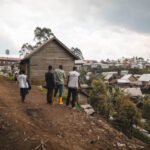A group of civil society organisation (CSOs) in Nigeria says the Strengthening Citizens’ Resistance Against Prevalence of Corruption (SCRAP-C) intervention has moved 93 contractors and 259 legislators back to project sites.
The group made up of ActionAid Nigeria (AAN), Centre for Communication and Social Impact (CCSI), and Centre for Democracy and Development (CDD) provided the SCRAP-C-related development at the end of the campaign.
Although Nigeria is Africa’s biggest oil exporter and has the largest natural gas reserves in the continent, it has struggled overtime to achieve its full potential.
The country accounts for about 200 million people and available data shows that about 87 million Nigerians, or half the population, live on less than US$1.90 per day.
Corruption, according to social and economic analysts, has given room for diversion of the limited public funds, undermined economic progress and impeded policy changes required for the development of Africa’s most populous nation.
SCRAP-C, according to the CSOs, was therefore launched to increase the capacity of Nigerians in resisting, discouraging and reporting acts of corruption.
The project, which was designed to recover public funds, increase citizen’s participation in reporting cases of corruption, and accelerate the completion of abandoned public projects, was implemented in Kaduna, Kano, Borno, Lagos, Akwa Ibom, Enugu, and the Federal Capital Territory (FCT).
In collaboration with the Independent Corrupt Practices Commission (ICPC), and the Economic and Financial Crimes Commission (EFCC), the SCRAP-C project, in three years and nine months, was said to have tracked 2,045 projects worth £111,488,950.22 between October 2019 and July 2020.
‘This intervention has moved 93 contractors and 259 legislators back to project sites, 261 cases were recommended for investigation, 40 cases recommended for recovery of public funds’, ActionAid Country Director, Ene Obi, said at the closing ceremony of the project in Abuja.
‘Within the last three years and nine months of implementing the project, six community anti-corruption working groups were inaugurated across the six Area Councils of the Federal Capital Territory to change citizens’ perceptions towards legitimising corruption.
‘Our constant citizens’ engagement on anti-corruption crusade, in Kaduna State, the National Assembly re-inserted a previously neglected constituency project worth N40 million for the construction of a Primary Health Care (PHC), into the 2018 budgets and the project has now been completed’.
Also speaking, CDD Country Director, Idayat Hassan, said more than 300 children, as a result of the project, now have access to nursery and primary education in Alimosho area of Lagos.
‘One remarkable thing about the [SCRAP-C] project is that through the social audit intervention the State Universal Basic Education Board chairman returned a contractor to the site to complete a story building of ten classrooms at the Rauf Aregbesola Nursery and Primary School, Shasha community in Alimosho local government council area of Lagos State.
‘The project had been abandoned by the contractor for over two years since it was awarded’.
For her part, the CCSI Executive Director, Babafunke Fagbemi, commended the Nigerian media for supporting the campaign within the period of implementation.
‘We are proud of the changes in citizen’s attitude to corruption’, Fagbemi said.
‘For example, in Borno and Kano States, citizens now have the knowledge of how to report corruption cases to ICPC, EFCC and some state anti-graft agencies’.
Source: ActionAid Nigeria
Photo source: j-No




